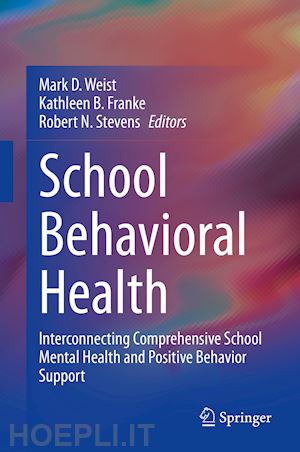

Questo prodotto usufruisce delle SPEDIZIONI GRATIS
selezionando l'opzione Corriere Veloce in fase di ordine.
Pagabile anche con Carta della cultura giovani e del merito, 18App Bonus Cultura e Carta del Docente
This book examines the prevalence of emotional and behavioral problems in youth and the implications of little or low-quality mental health services available for them. It describes aspects of Positive Behavioral Interventions and Supports (PBIS) and school mental health (SMH) that work together to form a comprehensive service delivery model called the Interconnected Systems Framework (ISF). The term school behavioral health (SBH) is used to describe SMH and PBIS working together, as in the ISF. The book examines perspectives of key stakeholders through a series of research forums, during which participants identified critical themes for the advancement of SBH in South Carolina and the southeast region of the United States. Chapters address key themes of school behavioral health from these forums, such as collaboration, schoolwide approaches, quality of services, and support for specific populations, including military families and youth involved in the juvenile justiceand child welfare systems. The book addresses barriers to providing behavioral health services at school as well as recommendations from key stakeholders for advancing SBH along these critical dimensions.
This volume is a must-have resource for researchers, professors, and graduate students as well as practitioners, clinicians, and therapists across such interrelated disciplines as clinical child and school psychology, educational policy and politics, social work, public health, school counseling, family studies, juvenile justice, child and adolescent psychiatry, and child welfare and well-being services.
Chapter 1: Overview of School Behavioral Health.- Chapter 2: Collaboration and School Behavioral Health.- Chapter 3: Schoolwide Approaches and Student Behavioral Health.- Chapter 4: Cultural Humility and School Behavioral Health.- Chapter 5: Quality of Services and School Behavioral Health.- Chapter 6: Implementation Support and School Behavioral Health.- Chapter 7: Juvenile Justice and School Behavioral Health.- Chapter 8: Child Welfare and School Behavioral Health.- Chapter 9: Military Families and School Behavioral Health.
Mark D. Weist, Ph.D., received a doctorate in clinical psychology from Virginia Tech in 1991 and is currently a Professor in the Department of Psychology at the University of South Carolina. He was on the faculty of the University of Maryland School of Medicine (UMSM) for 19 years, where he helped found and direct the Center for School Mental Health, one of two national centers providing leadership to the advancement of school mental health (SMH) policies and programs in the United States. He has led several federally funded research grants, advised national research and policy oriented committees, and testified before Congress and presented to the President’s New Freedom Commission on Mental Health. He helped found the School Mental Health International Leadership Exchange. Dr. Weist has edited 12 books and published and presented widely in the SMH field and in the areas of positive behavior support, trauma, violence and youth, evidence-based practice, and cognitive behavioral therapy.
Kathleen Franke, Ph.D., BCBA, is a licensed psychologist and Board Certified Behavior Analyst. She currently serves as the Director of Psychological Services at The Unumb Center for Neurodevelopment. Dr. Franke obtained her doctorate in school psychology at the University of South Carolina in 2018, and she completed her doctoral internship at the Kennedy Krieger Institute at the Johns Hopkins University School of Medicine in Baltimore, Maryland. She completed her postdoctoral fellowship at the Autism Academy of South Carolina and the University of South Carolina. At the University of South Carolina, she served as a member of the School Behavioral Health Team, where she conducted and disseminated research regarding the provision of school behavioral health services.
Robert N. Stevens, Ph.D., received his doctorate from Florida State University with an emphasis in behavioral statistics. He has 40 years of experience in education as a teacher, coach, principal, college administrator, and professor. He has been Vice President at Charleston Southern University as well as Vice President of Marketing and Research at Benefitfocus.com (providing technology solutions to health insurers). His current initiatives include Creation of a SC’s At-Risk Alert Reporting System (ARAS) to prevent student dropout and improve evidence based interventions; Ccair for the Carolina’s Collaborative Patient Perspectives Group to the Mid-South CDRN; co-PI for the School Mental Health Eugene Washington Dissemination Grant (PCORI); co-chair of the SC School Behavioral Health Conference; and Coordinator of the South Carolina Association of Positive Behavior Support. Previous initiatives include: steering committee chair for the SC-DOE School Climate Initiative and Index (US-DOE); and co-principal Investigator for Boeing Wellness/MUSC Center School Wellness Index (SC Translational Research Institute).











Il sito utilizza cookie ed altri strumenti di tracciamento che raccolgono informazioni dal dispositivo dell’utente. Oltre ai cookie tecnici ed analitici aggregati, strettamente necessari per il funzionamento di questo sito web, previo consenso dell’utente possono essere installati cookie di profilazione e marketing e cookie dei social media. Cliccando su “Accetto tutti i cookie” saranno attivate tutte le categorie di cookie. Per accettare solo deterninate categorie di cookie, cliccare invece su “Impostazioni cookie”. Chiudendo il banner o continuando a navigare saranno installati solo cookie tecnici. Per maggiori dettagli, consultare la Cookie Policy.